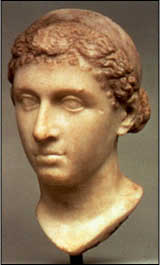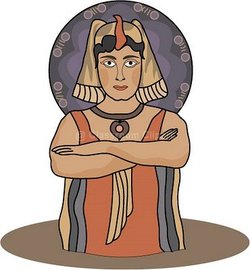Cleopatra VII of Egypt
|
|
Cleopatra VII Philopator (Κλεοπάτρα θεά φιλοπάτωρ, December, 70 BC or January, 69 BC–August 12?, 30 BC) was queen of ancient Egypt. She was the last member of the Macedonian Ptolemaic dynasty and hence the last Greek ruler of Egypt. Her father was Ptolemy XII Auletes, and her mother was probably Auletes's sister, Cleopatra V Tryphaena. The name "Cleopatra" is Greek for "father's glory"; her full name, "Cleopatra Thea Philopator" means "the Goddess Cleopatra, Beloved of Her Father."
Today she is probably the most famous of all of ancient Egypt's rulers, and is usually known as simply Cleopatra, all of her similarly-named predecessors having been largely forgotten. Cleopatra was never in fact the sole ruler of Egypt; she only co-ruled with her father, brother, brother-husband, and son. However, in all these cases, her co-rulers were king in title only, with her keeping the true authority.
| Contents |
Biography
Cleopatra VII was Greek and born in Alexandria, Egypt, took the throne alone at the death of her father Ptolemy XII in spring 51 BC. She was at the time the oldest child of Auletes, since two older sisters had died. She also had one younger sister whose name was Arsino뮠She was first briefly co-ruler with her father. She was subsequently co-ruler with two of her brothers, Ptolemy XIII, who opposed the Roman domination, and Ptolemy XIV. Since the Ptolomaic throne was transmited in matrilinear fashion, the Kings had to marry their sisters in order to be qualified to rule. Following the deaths of her brothers she named her eldest son co-ruler as Ptolemy XV Caesarion (44–30 BC).
In 48 BC, the advisors of Ptolemy XIII, led by the eunuch Pothinus, removed Cleopatra's power and forced her to flee Egypt. Her sister Arsino렡ccompanied her. Later that year, however, Ptolemy imperiled his own power by injudiciously meddling in the affairs of Rome. When Pompey, fleeing the victorious Julius Caesar, arrived in Alexandria seeking sanctuary, Ptolemy had him murdered in order to ingratiate himself with Caesar. Caesar was so repelled by this treachery that he seized the Egyptian capital and imposed himself as arbiter between the rival claims of Ptolemy and Cleopatra. (It should be noted that Pompey had been married to Caesar's daughter, who died giving birth to their son). After a short war, Ptolemy XIII was killed and Caesar restored Cleopatra to her throne, with Ptolemy XIV as new co-ruler.
Caesar wintered in Egypt in 48 BC–47 BC, and Cleopatra shored up her political advantage by becoming his lover. Egypt remained independent, but three Roman legions were left to protect it. Cleopatra's winter liaison with Caesar produced a son whom they named Ptolemy Caesar (nicknamed Caesarion, little Caesar). However, Caesar refused to make the boy his heir, naming his grand-nephew Octavian instead.
Cleopatra and Caesarion visited Rome between 46 BC and 44 BC and were present when Caesar was assassinated. Before or just after she returned to Egypt, Ptolemy XIV died mysteriously. Cleopatra then made Caesarion her co-regent. She may have poisoned her brother.
In 42 BC, Mark Antony, one of the triumvirs who ruled Rome in the power vacuum following Caesar's death, summoned Cleopatra to meet him in Tarsus to answer questions about her loyalty. Cleopatra arrived in great state, and so charmed Antony that he chose to spend the winter of 42 BC–41 BC with her in Alexandria. During the winter, she became pregnant with twins, who were named Cleopatra Selene and Alexander Helios.
Four years later, in 37 BC, Antony visited Alexandria again while en route to make war with the Parthians. He renewed his relationship with Cleopatra, and from this point on Alexandria would be his home. He may have married Cleopatra according to the Egyptian rite (a letter quoted in Suetonius suggests this), although he was at the time, married to Octavia, sister of his fellow triumvir Octavian. He and Cleopatra had another child, Ptolemy Philadelphus. At the Donations of Alexandria in late 34 BC, following Antony's conquest of Armenia, Cleopatra and Caesarion were crowned co-rulers of Egypt and Cyprus; Alexander Helios was crowned ruler of Armenia, Media, and Parthia; Cleopatra Selene was crowned ruler of Cyrenaica and Libya; and Ptolemy Philadelphus was crowned ruler of Phoenicia, Syria, and Cilicia. Cleopatra also took the title of Queen of Kings.
There are a number of unverifiable but famous stories about Cleopatra, of which one of the best known is that, at one of the lavish dinners she shared with Antony, she playfully bet him that she could spend ten million sesterces on a dinner. He accepted the bet. The next night, she had a conventional, unspectacular meal served; he was ridiculing this, when she ordered the second course — only a cup of strong vinegar. She then removed one of her priceless pearl earrings, dropped it into the vinegar, allowed it to dissolve, and drank the mixture.
Antony's behaviour was considered outrageous by the Romans, and Octavian convinced the senate to levy war against Egypt. In 31 BC Antony's forces faced the Romans in a naval action off the coast of Actium. Cleopatra was present with a fleet of her own, but when she saw that Antony's poorly equipped and manned ships were losing to the Romans' superior vessels, she took flight. Antony abandoned the battle to follow her.
Following the battle of Actium, Octavian invaded Egypt. As he approached Alexandria, Antony's armies deserted to Octavian. Cleopatra and Antony both committed suicide, Cleopatra by using a snake to poison herself on August 12 30 BC. Cleopatra's son by Caesar, Caesarion was executed by Octavian. The three children of Cleopatra with Antony were spared and taken back to Rome where they were reared by Antony's wife, Octavia.
It is often said that Cleopatra used an asp to kill herself. "Asp" technically refers to a variety of venomous snakes, but here, it refers to the Egyptian cobra, which was sometimes used to execute criminals. There is also a story that Cleopatra asked several of her servants to test out various forms of suicide, before choosing the method which she believed to be most effective.
A Graeco-Macedonian by language and culture, Cleopatra is reputed to have been the first member of her family in their 300-year reign in Egypt to have learnt the Egyptian language.
External links
General
- Cleopatra on the Web (http://www.isidore-of-seville.com/cleopatra/) - Some 470 resources, including ancient and modern pictures.
- Cleopatra VII Philopator ancient sources (http://www.tyndale.cam.ac.uk/Egypt/ptolemies/cleopatra_vii.htm)
- Cleopatra VII (VI) at LacusCurtius (http://penelope.uchicago.edu/Thayer/E/Gazetteer/Places/Africa/Egypt/_Texts/BEVHOP/13*.html) — (Chapter XIII of E. R. Bevan's House of Ptolemy, 1923)
- Cleopatra (http://www.gutenberg.net/browse/BIBREC/BR10992.HTM) - a Victorian children's book by Jacob Abbott, 1852, Project Gutenberg edition.
- Genealogy of Cleopatra VII (http://www.geocities.com/christopherjbennett/ptolemies/genealogy.htm)
Paintings of Cleopatra
- Sir Thomas Browne: Of the Picture describing the death of Cleopatra (http://penelope.uchicago.edu/pseudodoxia/pseudo512.html) (1672)
- John Sartain: On the Antique Portrait of Cleopatra (http://penelope.uchicago.edu/oddnotes/cleoinencaustic/cleopatraencaustic.html) (1818)
| Preceded by: Ptolemy XII | Ptolemaic Queen of Egypt with Ptolemy XII, Ptolemy XIII, Ptolemy XIV, and Ptolemy XV | Succeeded by: — |


